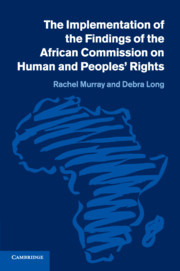Description
The Implementation of the Findings of the African Commission on Human and Peoples' Rights
Authors: Murray Rachel, Long Debra
By what process and mechanisms can the findings of the African Commission be implemented and that implementation monitored?
Language: English
Subject for The Implementation of the Findings of the African...:
Approximative price 34.17 €
In Print (Delivery period: 14 days).
Add to cart
The Implementation of the Findings of the African Commission on Human and Peoples' Rights
Publication date: 12-2018
Support: Print on demand
Publication date: 12-2018
Support: Print on demand
Approximative price 104.26 €
In Print (Delivery period: 14 days).
Add to cart
The Implementation of the Findings of the African Commission on Human and Peoples' Rights
Publication date: 05-2015
314 p. · 15.2x22.9 cm · Hardback
Publication date: 05-2015
314 p. · 15.2x22.9 cm · Hardback
Description
/li>Contents
/li>Biography
/li>
An 'implementation crisis' has been identified in the enforcement of rulings of UN and regional human rights bodies, and fundamental but crucial questions remain unanswered: what exactly does it mean to implement and comply with international and regional human rights decisions, and what factors influence whether a state implements and complies or not? Much more is now known about the work of the African Commission on Human and Peoples' Rights, but a gap still exists in the literature on the implementation of the findings of the Commission. This book draws upon the data and evaluation from a four-year research project, analysing the range of pronouncements of the African Commission, including its decisions on individual communications, provisional measures, resolutions, and promotional and protective mission reports. It investigates the extent to which states implement these findings and examines how that implementation is monitored by others.
1. Introduction; 2. Soft/hard, binding/non-binding: a useful distinction?; 3. Concepts of implementation, compliance and follow-up; 4. Range and status of findings from the African Commission on Human and Peoples' Rights; 5. The 'use' of the African Commission findings at the national, regional and international levels; 6. Follow-up and implementation at the national level; 7. What role should the African Commission play in following up its own findings?; 8. The relationship with the African Court; 9. The role of the African Union; 10. Conclusion; Appendix I. African Charter on Human and Peoples' Rights; Appendix II. Protocol to the African Charter on Human and Peoples' Rights Establishing the African Court on Human and Peoples' Rights; Appendix III. Rules of Procedure of the African Commission on Human and Peoples' Rights; Appendix IV. Resolution on the Importance of the Implementation of the Recommendations of the African Commission on Human and Peoples' Rights by States Parties.
Rachel Murray is Professor of International Human Rights Law and Director of the Human Rights Implementation Centre at the University of Bristol Law School. Her specialist areas are human rights in Africa, particularly the African Charter and its Commission and Court on Human and Peoples' Rights and the African Union, national human rights institutions, the Optional Protocol to the UN Convention Against Torture (OPCAT) and implementation. Her publications include Optional Protocol to the UN Convention against Torture (2011), The Role of National Human Rights Institutions at the International and Regional Levels (2007), Human Rights in Africa, from Organization of African Unity to African Union (2004), The African Charter on Human and Peoples' Rights: The System at Work, with Malcolm Evans (2008), and The African Commission on Human and Peoples' Rights and International Law (2000).
Debra Long is a Research Associate at the Human Rights Implementation Centre of the University of Bristol and a UK qualified lawyer who has specialised in the rights of persons deprived of their liberty. Her work has a particular focus on the African human rights system and the prevention of torture and other ill-treatment. At the regional level Debra was closely involved in the drafting of the Robben Island Guidelines for the Prevention of Torture in Africa (RIG), which were subsequently adopted by the African Commission on Human and Peoples' Rights in 2002. Recently she has also been involved in the 'Article 5 Initiative', a partnership which has developed a package of tools for the domestication and implementation of the UN Convention against Torture in Africa.
Debra Long is a Research Associate at the Human Rights Implementation Centre of the University of Bristol and a UK qualified lawyer who has specialised in the rights of persons deprived of their liberty. Her work has a particular focus on the African human rights system and the prevention of torture and other ill-treatment. At the regional level Debra was closely involved in the drafting of the Robben Island Guidelines for the Prevention of Torture in Africa (RIG), which were subsequently adopted by the African Commission on Human and Peoples' Rights in 2002. Recently she has also been involved in the 'Article 5 Initiative', a partnership which has developed a package of tools for the domestication and implementation of the UN Convention against Torture in Africa.
© 2024 LAVOISIER S.A.S.




